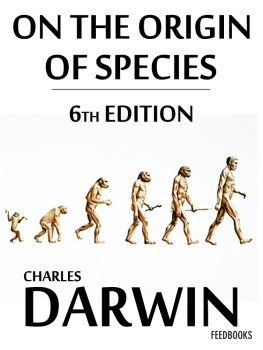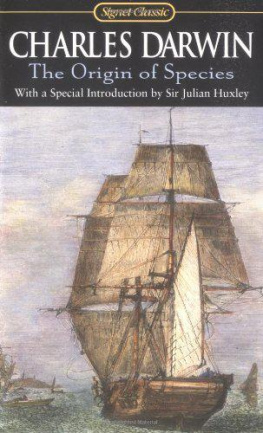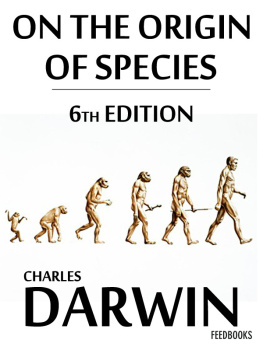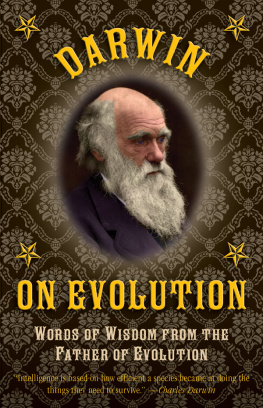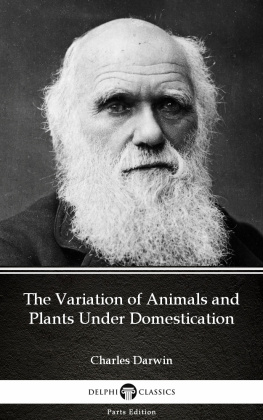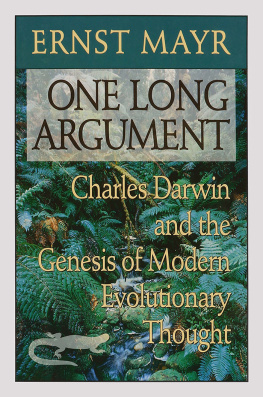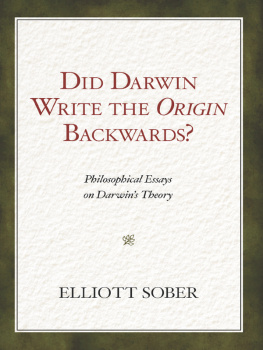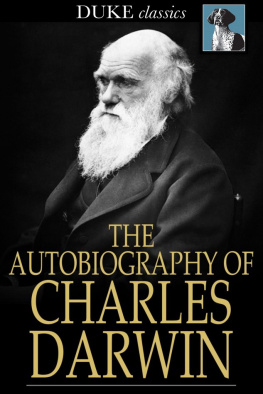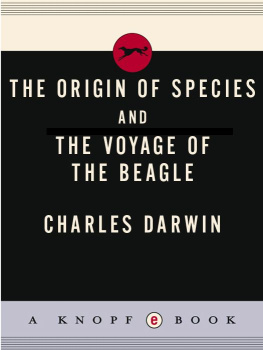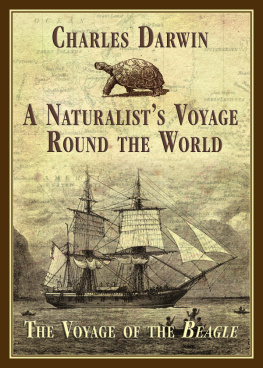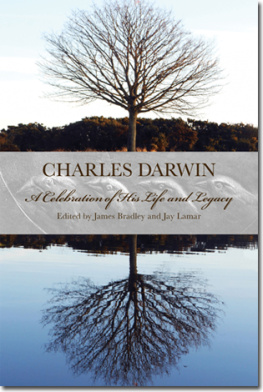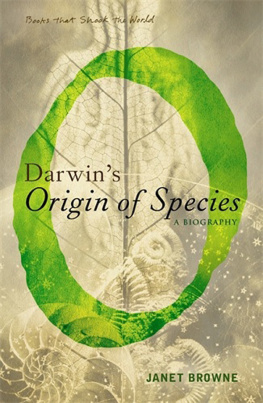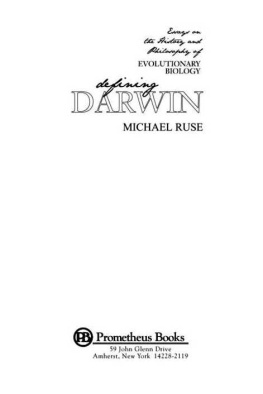Evolutionary Writings

Great Clarendon Street, Oxford OX2 6DP
Oxford University Press is a department of the University of Oxford.
It furthers the Universitys objective of excellence in research, scholarship, and education by publishing worldwide in
Oxford New York
Auckland Cape Town Dar es Salaam Hong Kong Karachi
Kuala Lumpur Madrid Melbourne Mexico City Nairobi
New Delhi Shanghai Taipei Toronto
With offices in
Argentina Austria Brazil Chile Czech Republic France Greece
Guatemala Hungary Italy Japan Poland Portugal Singapore
South Korea Switzerland Thailand Turkey Ukraine Vietnam
Oxford is a registered trade mark of Oxford University Press
in the UK and in certain other countries
Published in the United States
by Oxford University Press Inc., New York
Editorial material and selection James A. Secord 2008
The moral rights of the author have been asserted
Database right Oxford University Press (maker)
First published 2008
All rights reserved. No part of this publication may be reproduced, stored in a retrieval system, or transmitted, in any form or by any means, without the prior permission in writing of Oxford University Press, or as expressly permitted by law, or under terms agreed with the appropriate reprographics rights organization. Enquiries concerning reproduction outside the scope of the above should be sent to the Rights Department, Oxford University Press, at the address above
You must not circulate this book in any other binding or cover
and you must impose the same condition on any acquirer
British Library Cataloguing in Publication Data
Data available
Library of Congress Cataloging in Publication Data
Data available
Typeset by SPI Publisher Services, Pondicherry, India
Printed in Great Britain
on acid-free paper by
Clays Ltd., St Ives plc
ISBN 9780199208630
1 3 5 7 9 10 8 6 4 2
CONTENTS
Journal of Researches into the Natural History and
Geology of the Countries Visited during the Voyage of
H.M.S. Beagle Round the World (1845)
This anthology stems from my involvement with the Darwin Correspondence Project, which is editing all the letters to and from Charles Darwin. The Project receives essential and very generous support from the Andrew W. Mellon Foundation, British Ecological Society, Isaac Newton Trust, John Templeton Foundation, National Endowment for the Humanities, and National Science Foundation. I wish to thank William Huxley Darwin for permission to publish the Recollections and 1838 Life, and the Syndics of Cambridge University Library, the Geological Society of London, Special Collections and Archives of Knox College Library, Galesburg, Illinois, Trustees of the National Library of Scotland, and Trustees of the Natural History Museum, London, for permission to publish manuscripts in their possession. Permission to publish material from the Correspondence of Charles Darwin, ed. F. Burkhardt et al. (1985) has been granted by the Syndics of Cambridge University Press. Heather Brink-Roby provided invaluable assistance throughout, and the biographical index is largely her work. Many individuals mentioned in the early pages of the Recollections were identified by Donald F. Harris. Paul White offered excellent suggestions and references for the Introduction, which was also much improved after discussion by the Past versus Present project of the Cambridge Victorian Studies Group, funded by the Leverhulme Trust. John van Wyhe has been unfailingly generous in sharing information, particularly through his remarkable Darwin website. I especially wish to thank Marwa Elshakry, who with the assistance of Ahmed Ragab has provided fresh translations from Arabic; Adriana Novoa and Alex Levine, for access to their forthcoming collection of Argentine responses; and Shelley Innes, for help with Russian and German translations. The capable support of Alison Pearn made it possible to finish this in time. I am also grateful to Janet Browne, Rosy Clarkson, Diana Donald, Samantha Evans, Nicola Gauld, Melanie Keene, Sam Kuper, Randal Keynes, David Kohn, David Livingstone, Peter Mandler, Clare Pettitt, Kees Rookmaaker, Liz Smith, and many other friends. Judith Luna has been an exemplary editor: patient, accommodating, and enthusiastic. I am most indebted to Anne Secord, whose encouragement and constructive criticism have been vital at every stage.
IF the intellectual landscape of the twentieth century was dominated by Marx, Freud and Darwin, it is clear that the reputation of only one of that heroic triumvirate has survived intact into the twenty-first. With so-called Darwinian views on economic and social competition in the ascendant, the international pre-eminence of Darwin is more marked than ever, his books more widely read and discussed than at any time since they first appeared. Darwins views on human origins, the beginnings of life, and the nature of the fossil record play key roles in controversies about religion and science, particularly in relation to the teaching of evolution in schools. His account of the human mind has proved central in the development of psychology. His subtle analyses of the interconnectedness of life and environment are reference points in debates about species extinction and climate change. He is hailed as a visionary in fields as diverse as linguistics and global geology. His theory of evolution by natural selection is the coping stone of the modern life sciences.
Darwins fame grew out of the reception of his books, and although he wrote thousands of letters and hundreds of scientific articles and occasional pieces, reading Darwin means reading books. Of these, three were instrumental in establishing his reputation during his lifetime: the revised edition of the Journal of Researches (1845), an account of his voyage around the world on HMS Beagle, which touched implicitly on evolutionary themes; On the Origin of Species (1859), which outlined his novel theory of evolution by natural selection; and The Descent of Man (1871), which applied his ideas to the study of humans. In terms of his personal reputation, the central text is Recollections of the Development of My Mind and Character, published in 1887 as the opening chapter in a memoir edited by one of his sons.
Darwinism is a global phenomenon. Origin has been translated into over thirty languages, more than any scientific work other than Euclid, while the Recollections and Descent of Man are each available in twenty. The power of Darwins writings derives from their ability to challenge, surprise, and inspire readers in the widest possible range of circumstances. It is because these books have been read in so many ways that it is vital to confront the texts in the originals and not just as pithy quotations or through piecemeal searches on the internet. Yet with the collected works occupying twenty-nine volumes, this is not an easy task. Existing selections often leave out Darwins most controversial and innovative ideas, and have been edited with an eye towards current evolutionary biology. Reading a single work, although an obvious starting point, is only a partial solution. Even the 500-plus pages of Origin say almost nothing about humans and give a tactically skewed view of what its author is trying to do.
So much has been at stake in reading Darwins deceptively simple prose that understanding his books has proved elusive. Darwin is often presented as believing in natural selection as the sole mechanism for evolution, but this was never the case, not even in the
Next page

